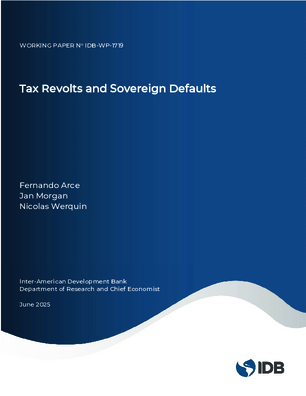Tax Revolts and Sovereign Defaults
Date issued
Jun 2025
Subject
Fiscal Policy;
Employee Turnover;
Sovereign Default;
Country Risk;
Rating;
Taxation;
Wage;
Productivity
JEL code
E32 - Business Fluctuations • Cycles;
E44 - Financial Markets and the Macroeconomy;
F41 - Open Economy Macroeconomics;
G01 - Financial Crises;
G28 - Government Policy and Regulation
Country
Argentina
Category
Working Papers
Political crises often coincide with fiscal crises, with complex causal dynamics at play. We examine the interaction between tax revolts and sovereign risk using a quantitative structural model calibrated to Argentina. In the model, the government can be controlled by political parties with different preferences for redistribution. Households may opt to revolt in response to the fiscal decisions of the ruler. While revolts entail economic costs, they also increase the likelihood of political turnover. Our model mirrors the data by generating political crises concurrent with fiscal turmoil. Specifically, we find that our model aligns closely with the conditions observed during the Macri administration (2015-2019). We find that left-leaning parties are more prone to default upon entering office, while right-leaning parties issue more debt. Our framework explains the high deficits observed during the Macri administration as well as the sovereign default that occurred immediately after the left regained power.
Generative AI enabled




